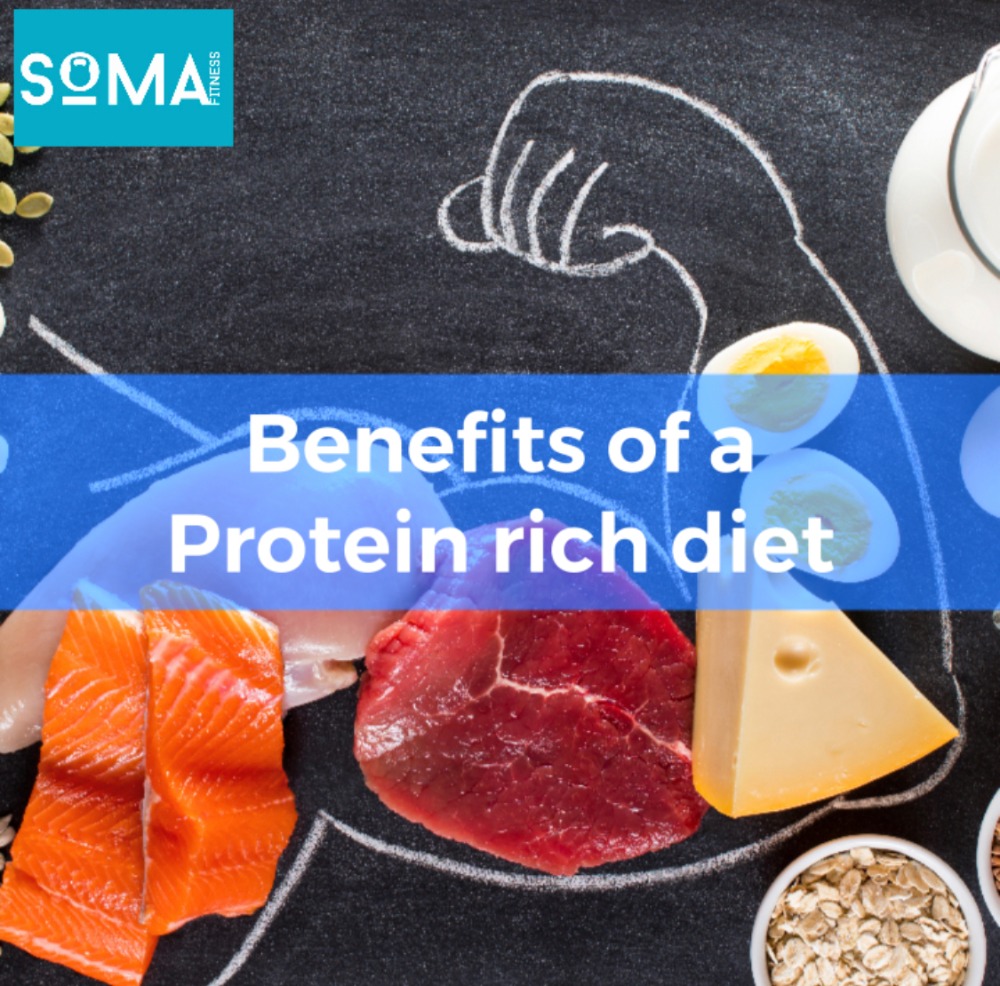Benefits of a protein rich diet

When people think about high protein diets, the only thought that may come to mind are your typical huge men in the free weights section walking round with a shaker cup and a stringer top. However, the benefits of a high protein diet go way beyond aiding muscle growth. This article will explore several reasons why a high protein diet can be beneficial for everybody.
Firstly, having adequate protein intake will elevate muscle protein synthesis. The benefits of this do include muscle growth for those wanting hypertrophy.
However, it’s also particularly important for anyone over 35 years old. This is because once we reach 35 years old we experience sarcopenia. This can be defined as a natural loss of muscle mass by amount 1% per year. This can be combatted by adequate protein intake and regular resistance training. Starting a high protein diet and regular resistance training younger can have huge benefits in later life. Having a larger amount of muscle mass in old age can help someone keep their independence by allowing them walk without a zimmer frame, climb stairs without a stair lift, and go to the toilet unassisted by a carer. Furthermore, elevated levels of muscle protein synthesis are going to aid the recovery process of any form of physical activity. A common myth is that endurance athletes won’t massively benefit from a high protein diet. However, adequate protein intake helps recovery from all forms of exercise. This is because proteins are the building blocks of muscle tissue. Therefore, stimulating their production (muscle protein synthesis) is going to drastically enhance their recovery.
Another benefit of a high protein diet is for bone health. There’s a myth that high protein intake can lead to losses of calcium, and therefore bone density. However, this is not the case as high protein diets have actually been shown to increase bone density. This is going to have benefits to everyone. However, the two populations that will benefit most from this will be the elderly and athletes who participate in impact sports. The elderly is more prone to falls, this means having good bone density is going to be essential in ensuring any injury that is caused is not something which is going to be long term, and something that can contribute to a loss of independence for the rest of their life. This particularly holds true for breaks in the pelvis, as its common for elderly people to not fully recover from this, making walking painful. As a result, they only walk when they absolutely have to, drastically reducing their physical activity levels which, in turn, takes years off their life via accelerated decline of their cardiovascular health.
Alternatively, athletes who participate in impact sports are going to have to have bones that can withstand high levels of contact in order to stay injury free. The higher the level of competitor, the more important this will be as higher-level athletes will train more and therefore have to withstand impact more often. Furthermore, higher level athletes may also get paid for performing, meaning that any injury is going to affect their earnings throughout their career. However, if the athlete is already injured, a high protein diet can help accelerate the recovery of the injured tissue. Meaning, that a high protein diet has its place in the prevention and rehabilitation of injuries in sport. It’s also suitable for an injured athlete to replace a given amount of carbohydrates with some more protein, as they will be training less so energy demand is lower.
A high protein diet is also essential for anyone trying to lose body fat. Firstly, due to its effects on muscle growth/retention mentioned above, which enhances fat loss in a calorie deficit. Secondly, it provides a higher level of satiety compared with the two other macronutrients (carbohydrates and fats). This will result in less cravings for snacks between meals, making it much easier to achieve a consistent calorie deficit on a daily basis. Lastly, digesting food requires the use of calories, this is called the Thermic Effect of Food (TEF). Protein has a higher level of TEF compared with the two other macronutrients, providing a further benefit to help one achieve a calorie deficit.
Overall, I hope these reasons show you how a high protein diet can provide a whole host of benefits to anyone from any sub-section of the population, from the most sedentary of individuals right up to elite athletes. Also, from young children, right up to adults in their elderly years. The ideal way to ensure you are getting enough protein would be to base your meals around a varying your protein source. Some common examples would be eggs for breakfast, chicken for lunch and fish for tea. Each protein source is going to differ in calories so it’s important that you track protein alongside your caloric intake so that your nutrition is in line with your goals.

Leave a Comment
(0 Comments)